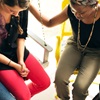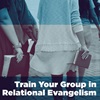Ephesians 4:3–6
I inherited an old trunk that sat in my grandma's basement. It had belonged to the generation before, who had used it to bring their possessions across the sea from Sweden. It sits in my dining room. It smells a little musty, but I treasure it as a link to my heritage.
I was thrilled to receive the trunk, but even happier when I opened it and saw my bonus surprise. The bottom was lined with pages of a newspaper from May 14, 1912. I framed these pages and hung them on a wall in my house. Whenever I look at these pages, I find something amusing. They're full of advertisements for remedies to cure everything from kidney trouble to headaches, dandruff, and excessive perspiration. They contain news stories that remind me of the fleeting nature of some of the things that seem newsworthy today. They also remind me that some things never change. But Page 7, the Society page, makes me a little sad.
A Different Kind of Community
The Society page contains updates about the travels of Mrs. Northrup, Mr. Graham, the Brooks family, and others. It tells who has out-of-town guests. It provides announcements for bridge parties and an upcoming Cooking Club get-together. It gives tips for hosting a perfect dinner party or afternoon tea.
Big deal, I know. So Colonel and Mrs. William Allaire had a bridge party. What's so sad about that? Well, it's not the bridge parties that make me sad. It's my feeling that we have lost something these turn-of-the-century folks had. They actually cared to read about these things in their city newspaper.
I know, we can read plenty of gossip in the newspaper any day. But this seems different. These aren't stories about movie stars, sports stars, criminals, famous addicts, or people who are famous for no particular reason. These were people that the newspaper readers would have actually known—people they wanted to keep track of.
These people belonged to a community.
I've been thinking a lot about community lately. I'll confess I believe I'm missing a skill set. I don't really know how to form community. Is this a lost art, or is it just me? Sure, I know how to make friends. I have terrific coworkers, whom I consider friends. I have friends at church, I'm friendly with my neighbors, and we get together regularly with other families we consider our friends. Many of our friends are scattered throughout the country, and some of them overseas—but we keep in touch.
But I don't think a network of friends necessarily equals a living, breathing community of people. Come to think of it, most of my friends don't even know each other. I can bounce from one friend to another—or one group to another—without a second thought. Even my church feels like a nice weekly gathering of people I barely know. I am not surrounded by a tightly woven web of people who experience life together.
This is what the Society page on my wall reminds me of. Perhaps community life has become a lost element of our society, its formation a lost art. Where are the bridge parties, ice cream socials, dinner parties, barn dances, and block parties hosted by people who actually live on the block, rather than sponsored by Pepsi?
I used to think it was weird to see silver serving sets, complete sets of beautiful china, ice buckets, crystal glasses, and other entertainment accessories in the homes of people who had been around for a while. Seemed like a waste—all those beautiful elements saved up for special occasions. Maybe it was a waste, I don't know. I'm not planning to go out a buy a silver set anytime soon. But something about it actually makes sense to me. It suggests that people valued hospitality and community, and saw those special occasions as worthy of something extra.
Our Most Important Job
As Americans in the 21st century, we tend to undervalue the sacred nature of community. We're all about the family and the rugged individual, the lone hero. And we are a lonely people. I wonder if we realize how desperately this loneliness eats at our souls.
Was it just out of convenience that God chose an entire nation of people and taught them how to live well in community? What it a coincidence that Christ created the church and gave us sacraments to practice in community? Should we be surprised that as we watch communities and their institutions disintegrate, the world feels like a more dangerous place?
In community we ground each other, encourage each other, hold each other accountable. When the Holy Spirit is present in a community of people, that community is sacred. We form the body of Christ. By ourselves we're just isolated body parts. And like body parts without a body, we struggle to survive.
Could it be that the most important job of Christian leaders is to foster strong, healthy, Christ-like community?
If so, how do we seek community in this individualistic society? How do we foster it among people who are so starved for time and rest, they don't feel their needs? God has called us to "make every effort to keep the unity of the Spirit through the bond of peace. There is one body and one Spirit—just as you were called to one hope when you were called—one Lord, one faith, one baptism; one God and Father of all, who is over all and through all and in all" (Ephesians 4:3–6).
As people in need of grace and salvation, we're unable to create perfect community. But perhaps we can start with the action of a courageous few who have a vision to pull us together in an authentic way. Maybe it starts with commitment. The people on my Society page probably didn't face the constant choice to stay or go, to move to the suburbs, to upgrade a house when interest rates were low. Most of them never thought about hopping around from church to church, trying to the find the perfect one to "meet their needs." Many of us do face those choices. I wonder what would happen if we chose to commit and stay put. Perhaps we would find that we have the skills to build community after all.
Amy Simpson is Executive Director of the Leadership Media Group at Christianity Today International. She also serves as Executive Editor of Gifted for Leadership, a resource for Christian women called to leadership. Click here to join the discussion about The Society Page.
Excerpted from our sister publication Gifted for Leadership, copyright 2008 by Christianity Today International.









